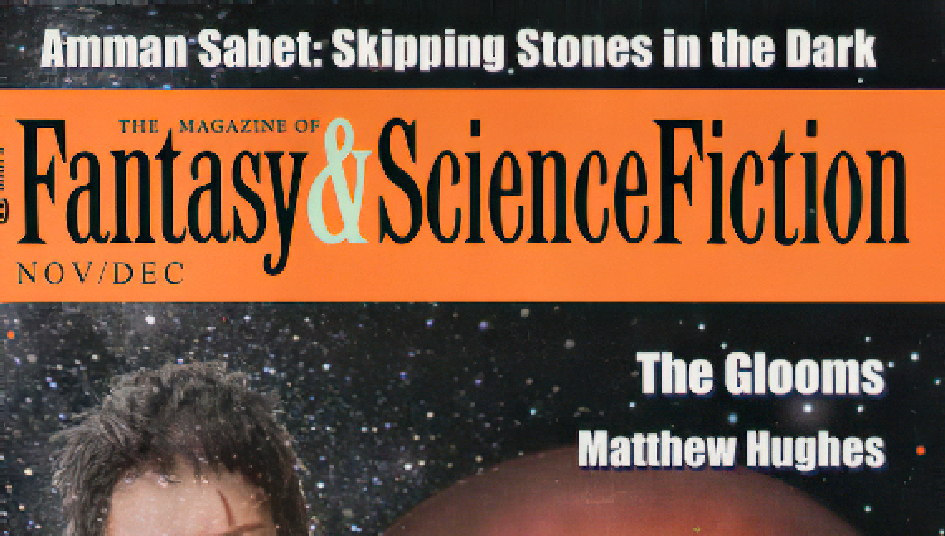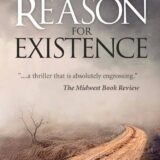CLUBHOUSE: Review: Neo-opsis Magazine issue #33

OBIR: Occasional Biased and Ignorant Reviews reflecting this reader’s opinion.

Neo-opsis Magazine – Issue #33, March 2022
Published out of Victoria, British Columbia, Canada.
Editor: Karl Johanson. Assistant Editor and Art Director: Stephanie Johanson.
Cover: Surf by Karl Johanson
Editorial:
Premise:
It’s all right to question science, but not if you’re doing it out of faith in ignorance.
Review:
Every scientist knows that science is self-questioning and always open to revision based on new knowledge. Trouble is, many people who know literally nothing about science and how it works glom onto the “anti-establishment question everything” mantra to justify rejecting what they don’t like in order to substitute pseudo-science baffle-gab they believe is rendered valid by the strength of their conviction. Simply put, we live in the age of cranks. This is dangerous. Especially since many leading politicians either cater to cranks or are cranks themselves. Karl is alerting us to the conundrum of living in a high-technology civilization which many people who benefit from it are eager to destroy. My opinion is that no one should be surprised if we plunge into a medieval culture of rank superstition. It seems to be what many people want. To be sure, high tech weaponry will continue, but virtually every other aspect of technological progress will stagnate and, quite possibly, decay. To sum up, ignorance is not a good thing. Too bad it enjoys a considerable cult status in these modern times.
Fiction:
Hands on the Wheel – by Robert Dawson
Premise:
Driverless cars aren’t supposed to crash, but these ones did. Appears to be a trend.
Review:
One of the unwritten laws of technology is that all technology, no matter how well intentioned, will be perverted. Of course, much depends on your definition of perversion, but still, technology always exceeds original purpose.
For instance, when the Lumière brothers introduced motion pictures in 1895 they envisioned their short films as light-hearted entertainment. Yet the first hard-core porno film appeared in 1912. Not what they originally had in mind.
Similarly, when Santos-Dumont became the first pilot to fly a heavier-than-air flying machine in Europe in 1906 he thought it would bring an end to warfare since he assumed it would render civilization so vulnerable to destruction that saner minds would prevail. He ultimately committed suicide in 1932 in his native Brazil after seeing a flight of bombers passing overhead on their way to bomb an airport during the Constitutionalist Revolution. Reality had trumped his idealism.
To sum up, no matter the original high-minded purpose, everything is ultimately perverted, primarily for reasons of gain, though sometimes just for fun. This story, set in the very near future, describes a plausible scenario wherein a mixture of pranksterism and greed proves fatal. I’m not a big fan of self-driving automobiles. Don’t trust them. This story well illustrates why. It’s entertaining, and not necessarily technically plausible, but the underlying lesson is perfectly valid. No matter what advance we make, someone will figure out how to subvert it. Futurists beware!
Breaking Camouflage – by Mark Silex
Premise:
One beneficial alien race is great to know. But what if a second is present on Earth, and they can’t stand one another?
Review:
Much SF has to do with figuring out how to interact with an alien race. Are they hostile? Are they friendly? Do first impressions count? Given how much our race studies itself in order to manipulate buying habits or motivate warring factions, it stands to reason a more sophisticated race would be able to mould our behaviour like a sculptor shapes putty. We know we can’t trust ourselves. How can we trust aliens? And if there are two forms of aliens telling us not to trust each other, how do we decide between them?
Of course, the classic human response to competing ideologies is to play one against the other. During the cold war many a third-world nation wound up with Soviet-built stadiums and Yankee-built factories. But sometimes ultimatums were issued; choose one side or the other. Especially difficult, say in Eastern Europe during the 1930s, when both super-powers in question were less than humane. It was a question of which side do you fear the most? But at least humans have some knowledge of how rotten humans can be. How do you judge non-human minds? By what they say? By what they do? When any or all of it may be pretense and dissimulation? Hell of a problem. We have yet to figure out our own thoughts and behaviour. We think we do, but we don’t. Alien minds will be even freakier to comprehend.
The solution revealed in this story isn’t exactly a solution, but it is the best coping mechanism the main characters come up with. Whether this will enable them to survive is another matter. Life is like that. No easy solutions. Makes you think, this story does.
The Sea Child – by Russ Adams
Premise:
What’s it like to be half-mermaid, half-human? Which is to say, fully human in appearance, yet almost literally a fish out of water?
Review:
Literature is full of characters belonging one way or another to more than one reality. Tarzan, for instance. At home in both the jungle and the Streets of New York. Sometimes it is hard to tell which is which. In this case a child is born of a mermaid mother and a human father. Physically, dry land is what she is suited for, but mentally? In truth she has no choice where to live. But how to live is another question.
And you thought you suffered from teenage angst? Nothing compared to this girl. Her fully human boyfriend doesn’t have an easy time of it either. Especially when she takes him “home” to meet the family, or, more accurately, her kin on her mother’s side. Yet neither world is truly “home.” How she copes with this is the crux of the story.
It’s a good story for teenagers suffering from self-doubt to read. All teenagers, in other words. At the same time there are some charmingly original concepts regarding mermaid mentality and nature. They are not simply women with fish tails instead of legs, or fish with human torsos and heads. They are creatures all their own, with instincts and impulses apart from ours. They are different. Not necessarily a bad thing. Which I suppose is the whole point teenagers need to learn about themselves. Fundamentally an optimistic, life-affirming story.
Yellow is the Colour of the End of the World – by KT Wagner
Premise:
Boyd is lucky. He made it to a well-stocked cave before the blasts hit. Renata, his cell phone, is his only companion.
Review:
Renata is a highly developed A.I. much more advanced than the modern-day Alexa. Good thing too. Not only is she full of useful advice, she’s good at problem-solving and anticipating future developments. But, it being the end of the world and all, isn’t she really just a time-filler to fight off boredom pending the inevitable? Boyd doesn’t think so. He’s happy to have someone to talk to, someone willing to listen, to respond and offer solutions. Never mind the future. She makes the present bearable. But how does she feel about him? About herself? About the future? Some questions are best left unanswered.
Post-nuclear war scenarios often involve single survivors fighting off madness, are often poignant glimpses of a desperate search for a reason to live. The 1959 Burgess Meredith Twilight Zone episode “Time Enough at Last” is probably the most famous example. I watched it at the age of eight when it was first broadcast and have never forgotten it. To this day it fills me with horror. Those of you who know it understand why it impacted me so powerfully. Every reader’s worst nightmare.
This story is a tad more optimistic… sort of. It does offer a vestige of hope, however faint. Constitutes an innovative twist on a classic trope. I always appreciate such. Reignites my sense of wonder.
The New Tudors – by Cat Girczyc
Premise:
The inhabitants of Elsinore-III, inspired by a book about the Tudor period, have crafted their civilization into a faux-Tudor reality, but are annoyed this doesn’t give them equal status with other members of the Galactic Authority. A trading ship is diverted to resolve the problem. Its Captain is not happy. Chances of profit are small.
Review:
The book was left behind by a scholar on board the first spaceship to visit the planet. The inhabitants appear to be entirely human. It is not explained if they are descendants of a previous wave of human colonists long forgotten, or a case of convergent evolution. It doesn’t matter. The core of the story is the interaction between a highly-advanced technological civilization (albeit disguised so as not to be too much of a shock) and a bunch of up-and-coming outliers eager to catch hold of the coat-tails of the off-worlders.
This is not an example of traumatic cultural clash equalling conquest, as in the case of the Spanish and the Aztecs. Rather, it has to do with two self-confident if disparate cultures jockeying for position to exploit the hell out of each other. Hard to say which is in the greatest peril. Yet each is forced, however reluctantly, to benefit the other in order to get what they want. Not only a battle of wits, but a cautious battle, as both “sides” need to avoid upsetting those of their own people who are reluctant to support radical “improvement” for fear it would only bugger things up beyond repair. Pretty much like an average day at the UN I imagine.
In short there are myriad subtle comic elements to this story. I quite enjoyed it. The ending is not so much decisive as a glorious muddle of obfuscation both sides can claim credit for, just as in real life diplomacy. Loads of fun.
The Test – by Karl Johanson
Premise:
What do you do when you see a dragon outside the classroom but the teacher doesn’t believe you?
Review:
This is a very brief story which nevertheless provides an unexpected plot twist plus an amusing if understated ending. It is as long as it needs to be, entertaining, and surprisingly evocative. I recall many a classroom session when I wished something as exciting as a dragon would dispel the tedium. Mind you, the air raid siren on the roof of my grade school unexpectedly coming to life (several practice alerts during the Cuban missile crisis) with us kids hustling to hide under our desks spiced things up a bit, but a dragon sighting would have been more fun, methinks.
To sum up, despite the fantasy elements this story captures something of the reality of a boring classroom session, and thus makes it easy for the reader to identify with the protagonist. Quick to read and the ending brings a smile to your lips. I like it.
Essential Maintenance – by Michèle Laframboise
Premise:
Jovian is a repairman aboard the cruise liner Space Wonder. Most jobs, such as fixing malfunctioning artificial gravity cells, are routine, but passengers sometimes get in the way. Bit of a nuisance, that.
Review:
Jovian is content with his job, but not so much with his life. He’s a loner, and consciously and deliberately keeps apart from the crew’s habitual sexual shenanigans with each other (forbidden) and with the passengers (doubleplus forbidden). Still, there is that waitress he worships from afar. And now the intrusion of a passenger, an older woman dressed like a little girl. Most of the solitary passengers (as opposed to married couples) tend to be a little off, and off-putting, but for some reason this particular oddity seems like someone he needs to get to know better. This makes him anxious. Suddenly the shipboard routine is no longer routine. He’s worried.
Funny thing about emotions. Once aroused they tend to alter one’s perception and spoil one’s plans. Never know where they can lead you. This story is all about loss, and need, and fear, and longing. At first the science fiction aspects appear irrelevant, but ultimately they precipitate a crisis cathartic in nature that points toward a resolution. The same emotional content could work in another setting, perhaps, but the physical problem would have to be very different. As it stands, this story is all of a piece, emotional conflict resolution dependent on the nature of the ship and how it can affect passengers. The characters and setting are well integrated.
Basically, this is a coming of age story for a late bloomer of a man, and as such, rather charming. A bit odd, given the setting and the futuristic mindset which is somewhat different from ours, but ultimately optimistic and reassuring. Perhaps we don’t need to fear the future after all.
Nonfiction:
Assorted news re: awards, fandom, authors, space exploration, etc. And, as usual, a fascinating article on aspects of the Periodic Table.
CONCLUSION:
A good mix of science fiction and fantasy, all of it evocative and thought-provoking, as well as a pleasure to read. Absolutely well worth reading. I never miss an issue.
Find it at < Neo-opsis #33 >










